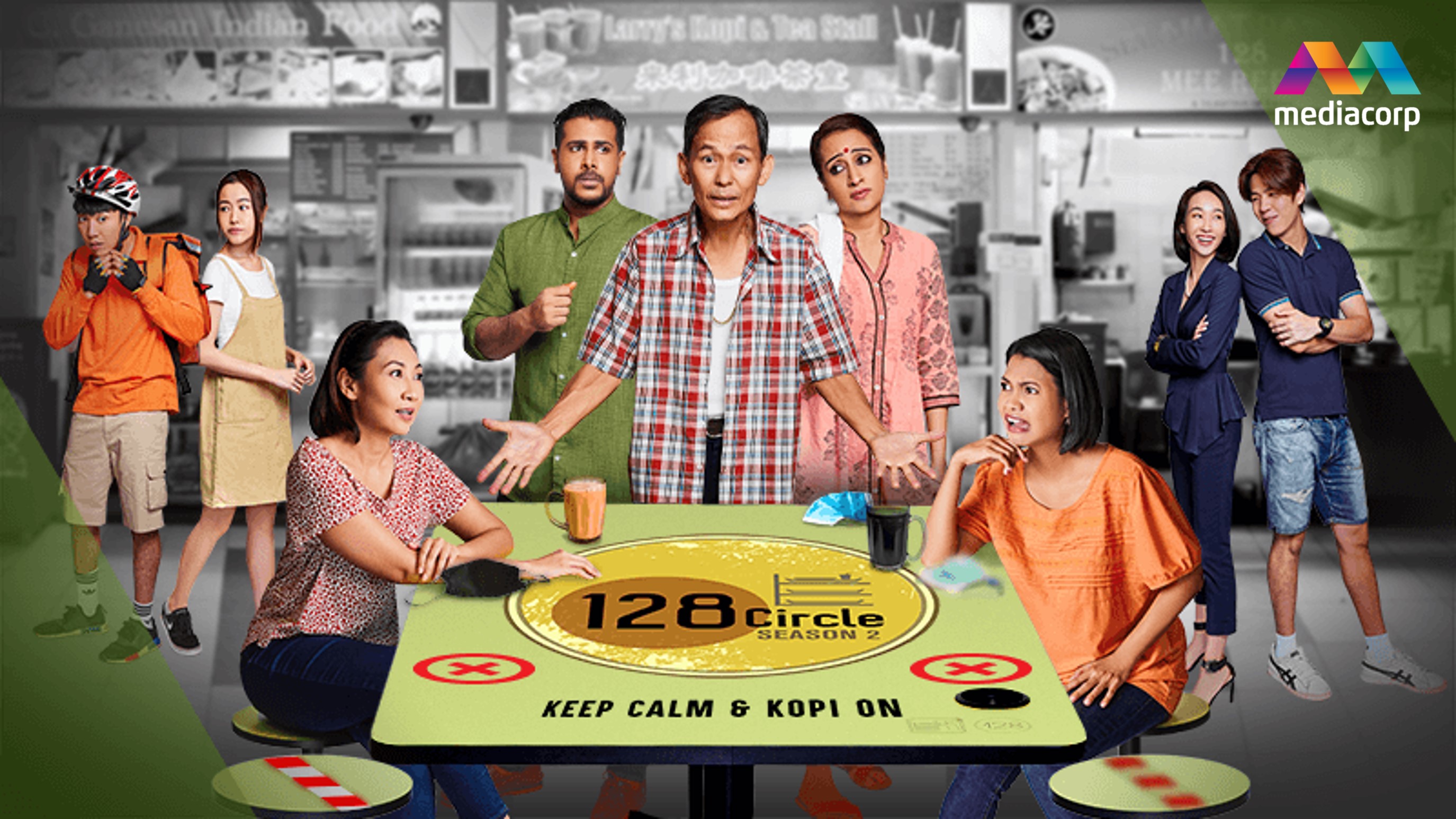Around the time I got this pitch, my business colleague asked me when was the last time I watched a Mediacorp drama.
I told them, "probably before puberty hit me."
Of course, that's hyperbole - but only marginally. Honestly, the last locally-produced drama that I vaguely remember following was the period drama Fighting Spiders (first broadcast in 2009). I'm also not joking when I say the television in my house is more often used as a horizontal mirror.
With digital streaming options offering easy access to global content, Singaporean shows haven't exactly been on my radar. Given that the last one I paid any attention to was set in the 60s, my impressions of local TV are probably slightly dated.
So when Mediacorp asked us for an honest review of Season 2 of a series called 128 Circle, I was curious enough to take it on.
Of Hawkers, Mee Siam Mai Hum(drum) & Ordinary Struggles
The show follows the ups and downs of a group of hawkers at 128 Circle Food Centre, from which the series derives its name. While it is a fictionalised setting, 128 Circle could just as readily be a stand-in for any food court familiar to locals and beloved by their communities.
We are then introduced to our ensemble cast:
- Ah Gek and Ah Tat (also known as Larry), an elderly married couple who run the drinks stall
- The recently widowed Aishah and her best friend Nurul, who operate a famous mee rebus stall together
- A family that works at the Indian food stall; Uncle Chandra, his wife Rani and their son Arun
- Ex-banker turned Hawkerpreneur Dominic and neurodivergent chef Sherry. The sibling duo behind one of 128 Circle's newest stalls, Hot Diggety Dawg
- Audrey and her longtime boyfriend Julian (both of whom are highflying attorneys), and Yi Kai, an assistant at a traditional dessert stall which Audrey finds herself frequenting
*Mild to moderate spoilers ahead*
In Season 1, each set of characters faces various challenges that can be typified by a confluence of financial woes and family drama. Furthermore, the scope of their ambitions and aspirations is frequently limited or undermined by the demands of reality.
Larry, for example, dreams of providing a comfortable retirement for himself and his wife. The elderly couple, however, has to take care of their granddaughter after her mother has to work overseas.
There are also criminal elements in his past that return to perturb him.
Rani and Arun have to deal with the frequent outbursts of their temperamental patriarch, Chandra, a stern father and even more imposing husband. His family secrets later threaten to tear all of them apart.
As for Audrey, she finds herself in a love triangle with Julian and Yi Kai, uncertain of what and who she wants.
The tension in these characters' lives is also exacerbated by the 40-year-old hawker centre facing permanent closure.
By the time Season 1 ends, 128 Circle has avoided this fate thanks to the intervention of a tycoon (though his generosity does come with its drawbacks).
However, a graver threat looms over the characters in Season 2: Covid-19.
The second season focuses on how the cast copes with that shudder inspiring three-word phrase, "the new normal". It spans the start of the Circuit Breaker period to the first two phases of Singapore's re-opening.
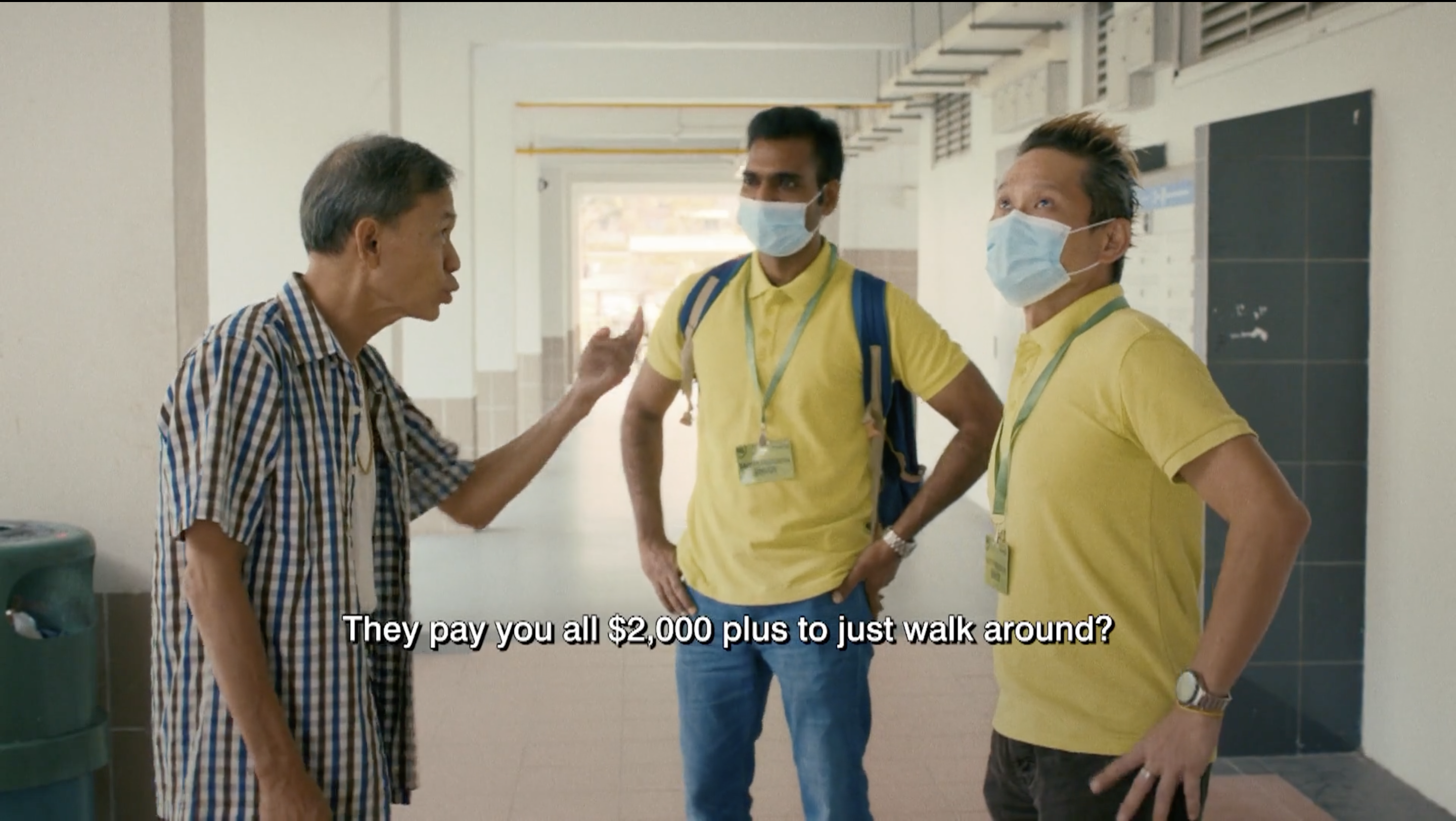 Pictured above: A tongue-in-cheek observation of Larry confronting his Season 1 nemesis turned Safety Protocol Envoy, a man somewhat intoxicated on authority-by-proxy. Zero points for guessing their real-life counterparts.
Pictured above: A tongue-in-cheek observation of Larry confronting his Season 1 nemesis turned Safety Protocol Envoy, a man somewhat intoxicated on authority-by-proxy. Zero points for guessing their real-life counterparts.
From pivoting to an online delivery platform to threading loopholes of social distancing regulations (in the name of love), the characters do their best to adjust to the various circumstances the pandemic has wrought upon them.
There are some new faces as well:
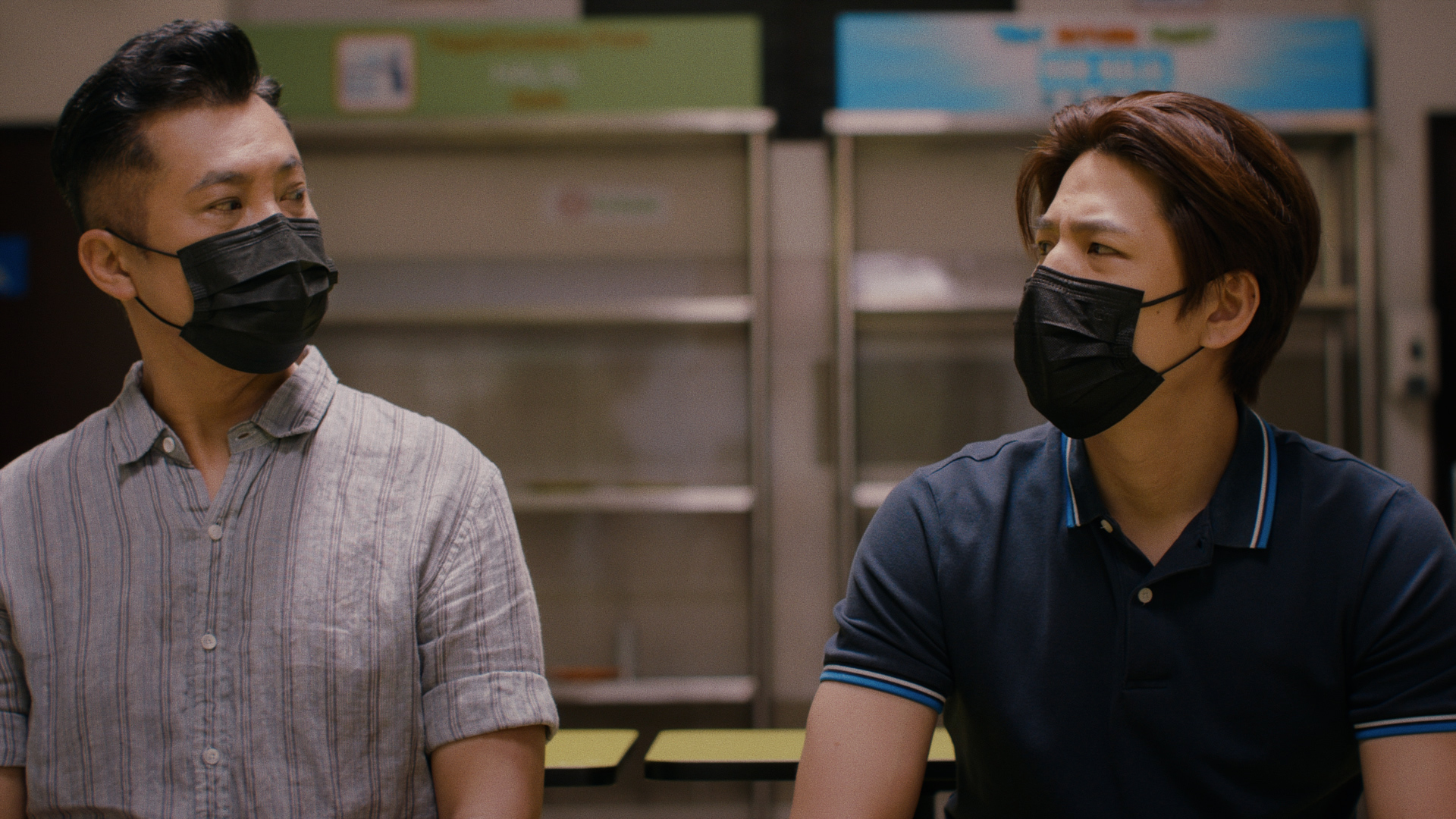 Potential in-laws sizing each other up?
Potential in-laws sizing each other up?
Both Yi Kai and the audience are introduced to Henry (Terence Cao), Audrey's father, a former businessman who derives much of his value from being a breadwinner.
Aishah also gains some neighbours in the form of a Filipino nurse and her precocious son.
Then there's Ethan (Charlie Goh), a delivery rider who in one episode, traverses the whole of Singapore (on his bike) to get Sherry a very specific brand of pine nuts.
Character-driven in a Crowded Car, Emotional Roadblocks Ahead
Confession time: When it comes to shows set up around an ensemble cast, I'm more inclined towards series’ where they have grander goals and stakes, e.g. making power grabs, fomenting political chaos and intrigue, or preventing climate change with perplexing prophecies.
128 Circle has no central plot, no epic, sprawling narrative that intricately ties various storylines together. Rather, it's a tapestry of average Singaporeans dealing with and overcoming personal adversity, a demonstration of how easily lives unravel, the bonds that uplift them and the moments of connection they revel in.
To its credit, in the absence of dragons, it's not like the separate plots drag on much. While the show is obviously no Game of Thrones, it does have its fair share of compelling characters and dynamics, most of whom are better fleshed out in the subsequent season.
Season 2 achieves this by throwing its characters problems that are less external or existential, and focuses more on the challenges of interpersonal relationships.
For instance, much of Aishah's story in the first season revolves around her assessing the risks and opportunities that comes with expanding her enterprise when she receives an offer to franchise her mee rebus business.
As the brainchild of her late husband, Halim, the stall is the most important thing she has left of him, and is essentially a stand-in for the offspring they never got to have together.
The second season provides her a much more literal surrogate in the form of her neighbour's kid whom she starts to look after as his mother works long shifts in the hospital.
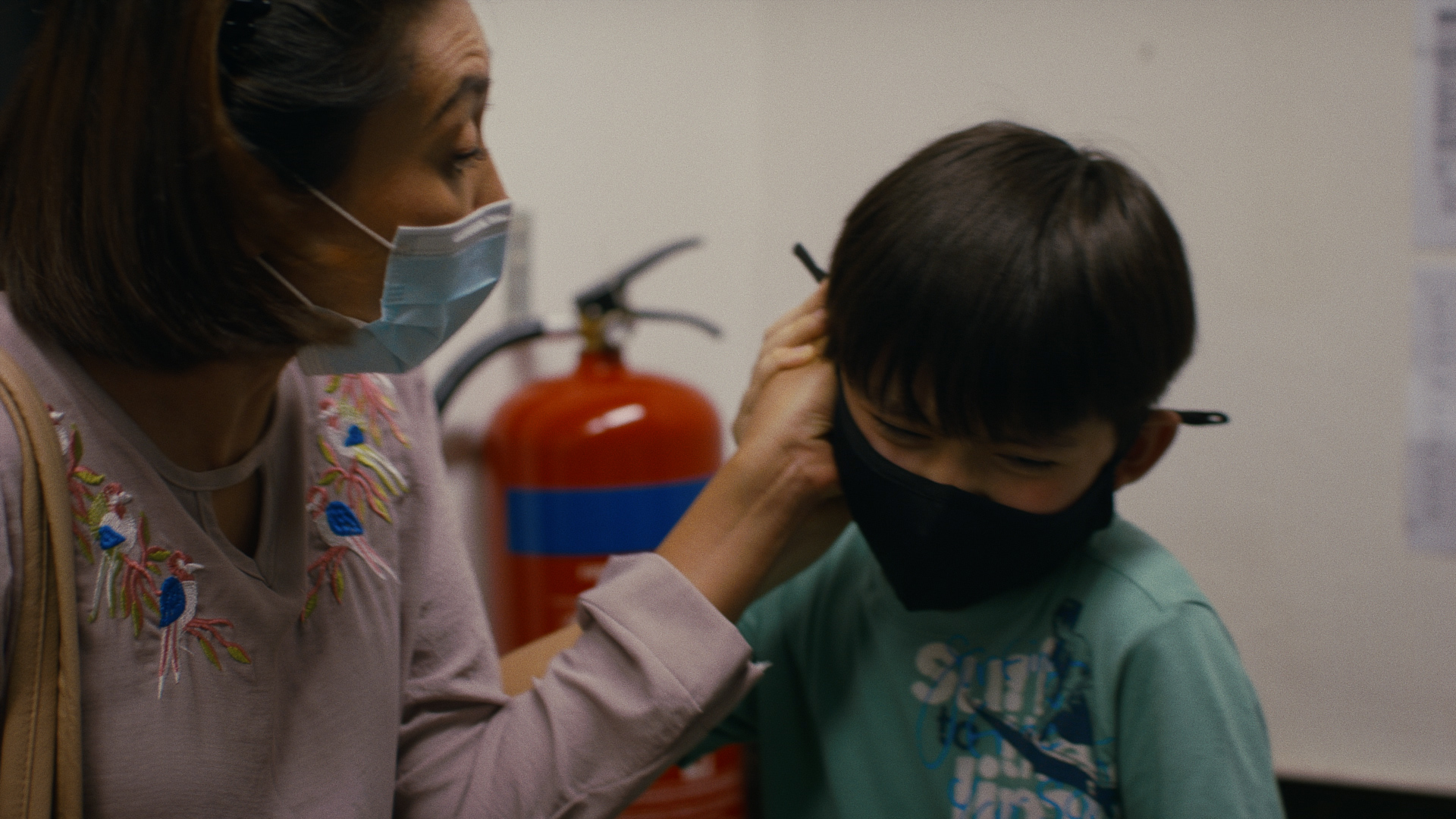 This kid portrays a menace so well his performance is an unintentional PSA to tie up the ol' fallopian tubes.
This kid portrays a menace so well his performance is an unintentional PSA to tie up the ol' fallopian tubes.
In this way, the show further explores Aishah's regrets and her yearning to be a parent, carried over from the first season. But any sentimentality she may have had about her maternal instincts quickly evaporates when pitted against Alec's antics. Now I'm not allowed to advocate for violence against children, however I suspect Aishah would have had an easier time if she got access to a rattan cane, that oh so inspirational artefact of many a Singaporean childhood.
Despite his behaviour leaning towards miscreant rather than merely mischievous (he shoplifts not once but twice), Aishah and Alec do develop a deep, abiding bond which is fairly touching.
The show does hold him accountable for his troublesome behaviour, and I was also able to empathise with his outbursts. After all, the interminable, pervasive sense of frustration heightened by the pandemic is a feeling any viewer would be familiar with.
At some point in the past two years, we've probably all wished we could resort to more juvenile expressions of our disappointments and tempers, instead of having to be repressed or stoic adults.
It's even more frustrating when it's practically impossible to articulate such emotions, as is the case with Sherry, a character who could be a conduit for understanding both these states.
In her portrayal of someone with special needs, actress Jae Liew had to channel an emotional interiority that would be unfamiliar to many viewers.
It's a fine balance between Sherry's apparent detachment and her underlying desire that sometimes amounts to desperation to be understood.
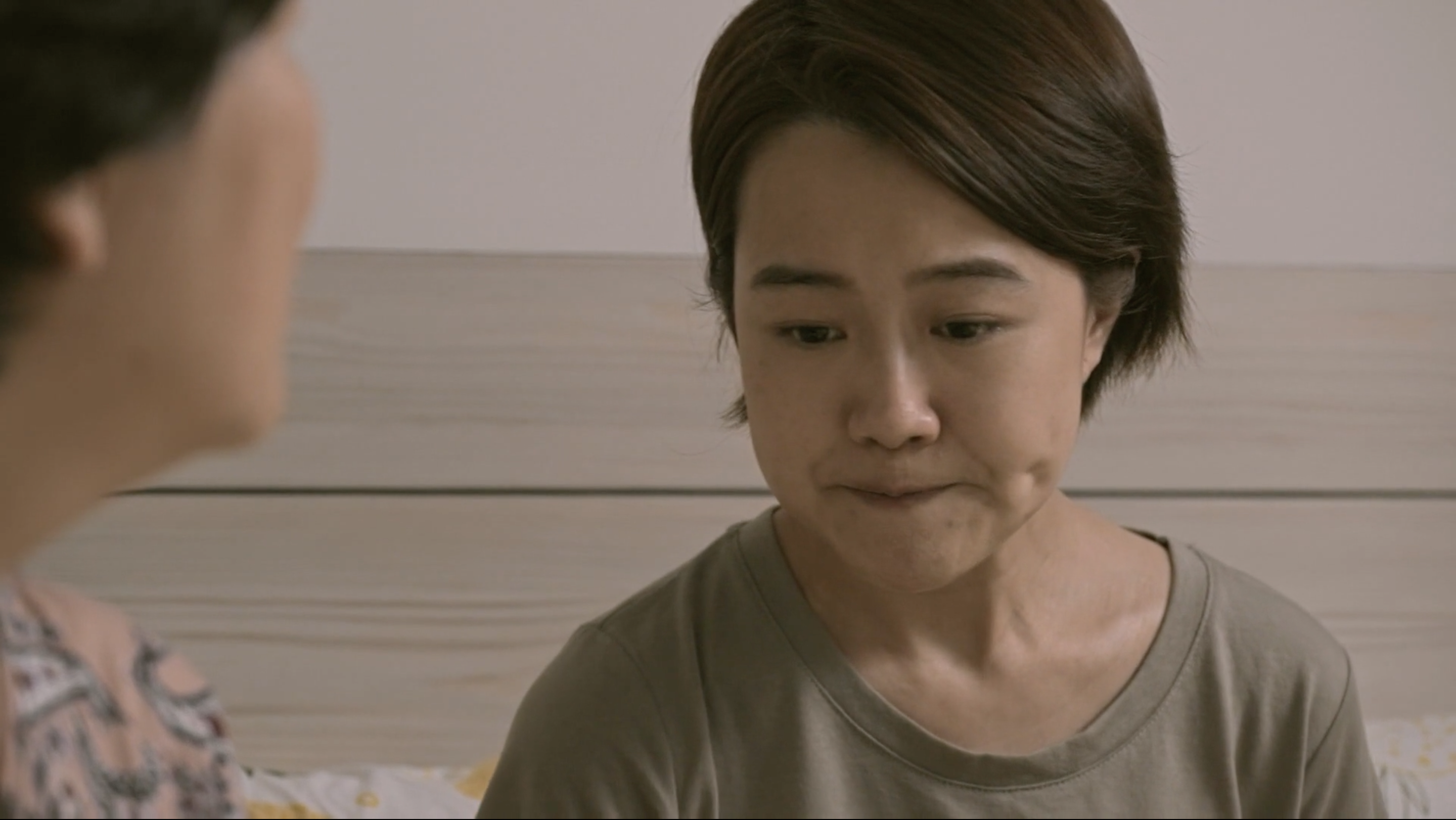 Sherry has a fraught discussion with her mother about returning to work at the stall after an unpleasant incident
Sherry has a fraught discussion with her mother about returning to work at the stall after an unpleasant incident
In the first season, she often seems unable to pick up on others' emotional disturbances, not insensitive but indifferent to their grievances. She seeks refuge from sentimental turbulence and turmoil in set routines and repeated mantras, which isn't to say her frustrations don't seep through such focus.
Liew harnesses Sherry's habits and imbues her "catchphrases" with impressive nuance so that the delivery of identical lines is ebullient in one scene and distraught in the next. Sherry's emotions have an unmistakable depth and range, conveyed in an admirably empathetic manner.
Her condition does not define her, and this is one of the more commendable achievements of the show, to have such a character exist beyond the confines of any potential sob story.
It even critiques the "feel good" or inspirational narrative such persons in our society are often pigeonholed into, with Sherry getting upset that she was exploited as a "marketing angle" when she finds out her brother paid an influencer to review the stall.
Sherry is one of the most strongly written characters in the entire series, with a distinctly fleshed out personality and clear ambitions. It's likely why I was much more readily invested in her romantic subplot with Ethan developed in Season 2 than whatever Audrey and Yi Kai had going on in the first season.
That dynamic felt like a shoehorned commentary on how love can transcend socio-economic backgrounds. While tackling elitism is a salient point, the show's examination of that subject was quite superficial. The height of friction and discomfort Yi Kai experiences is an awkward conversation about wine with some wealthy individual at one of Audrey's corporate parties.
However, 128 Circle fares better in portraying other important themes and messages.
A Slice of Life, with Not Too Dull a Knife
The choice to set Season 2 of 128 Circle in a Singapore pressured by the pandemic was inevitable and perhaps somewhat predictable. The treatment of its subplots is much more cohesive, if slightly clinical, but it benefits the show as it can spotlight necessary conversations about key topics.
These include mental health, emotional labour, and prejudice against frontline workers, plus it even manages to reference that age-old debate of philanthropy versus profit.
The second season also captures the pain and uncertainty many would have felt with the upheaval of their livelihoods.
The concept of jeopardising one's ability to provide for their family is expanded and expounded on from the first season. Now, it's a primary concern amongst the cast that is more relatable and relevant than ever.
Similarly, turning to friends and family as a source of support revisits the championing of a communal spirit, a theme at the forefront of the show's inception.
The message, if trite, is also tested. Relationships are strained between societal obligations of observing the rules and the need for connection.
Friendships, marriages and parent-child relationships all deteriorate in the wake of overblown arguments. Ultimately however, as in real life, most of these are repaired with candid conversations; sometimes tense, often difficult, but always necessary.

We see an example of this in Arun's rocky relationship with his father, Chandra.
In the first season, he yearns to establish his own catering business instead of taking over the family's hawker stall. The friction and frustration of trying to carve out one's future in the face of elders who assume they know better will probably feel familiar to many viewers who have recently entered adulthood. In fact, his desire and journey towards independence was something I found quite relatable.
At the same time, Chandra also appears to be the classic strict Asian parent who withholds their praise and affection for most of their child's upbringing. However, I could also recognise that his domineering streak as a dad was borne out of deep concern for his son. Furthermore, the way he frets about not having anyone to pass his legacy on to is largely sympathetic.
This strife between them also serves as a neat summary of how generations can clash. The audience is invited to consider difficult choices between stability or the opportunity to derive one's own definition of success. Is the better path self-actualisation, or maintaining harmony in our homes?
These values are not diametrically opposed, but there's undoubtedly tension when one priority eclipses the other. Ultimately, Arun is supported by his father in his venture. Chandra comes to accept that even if his son won't take over the stall, he's inherited his ideals of an industrious work ethic, compassion and generosity.
These are all principles we see play out in the second season when Arun has to make decisions between the bottom lines and supporting his staff, one of whom is a foreigner who is tangled up in a talent agency of dubious legality. The audience then gets to witness the challenges and compromises Arun takes on, forcing him to grow as both a boss, son and partner.
Final "Ta Paus" AKA Takeaways
Maybe this says more about my hubris - or how other streaming platforms' multiverse adventures have spoiled me - but I did not anticipate the seemingly mundane struggles of a group of hawkers to provide any rich source material for a TV series.
Personally, I tend to gravitate towards television that provides some sense of escapism.
By contrast, most of the characters in 128 Circle are just trying to eke out a living or aspire towards something beyond the bare minimum of survival. This simplicity gives the story very little to hide behind and I must admit I struggled with the plot's pacing at times.
Furthermore, some of the narrative developments felt contrived, to inject drama for the sake of it - but again, perhaps that's because the show is limited by its premise.
Nevertheless, my interest was sustained thanks to the familiarity and realism of how certain characters were portrayed.
Their narratives are not particularly dazzling, distinctive or high-stakes, but through them, the show demonstrates a level of groundedness that earns it its more thoughtful takes and examinations of social compacts.
After a 13 year absence of (or abstinence from) local dramas, my verdict is that with managed expectations, they're relatively entertaining.
Suffice to say it won't be another decade before I check out my next local show, and not because it's part of any job requirement.
Watch 128 Circle on meWATCH
The next time you're stuck in a snaking queue for nasi padang or bak chor mee, or just want to binge-watch something to make the line go faster, try checking out 128 Circle over on meWatch.
This sponsored article is brought to you by Mediacorp.
Top image via 128 Circle on meWATCH.
If you like what you read, follow us on Facebook, Instagram, Twitter and Telegram to get the latest updates.
